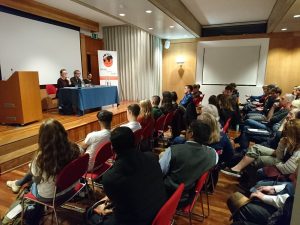Even with very strong mitigation, we face extreme heat events and a 20cm rise in sea levels by 2100, climate scientists warned at an event hosted by the Oxford India Centre for Sustainable Development this week.
The event, jointly organized with the Oxford Climate Society and held at Somerville College, heard from leading climate scientists Professor Simon Lewis of UCL and Dr Rachel James of Oxford’s Environmental Change Institute. The panel was held on the day the UN Intergovernmental Panel on Climate Change (IPCC) released a report warning that urgent change is needed to keep global warming at a maximum of 1.5C
Both Dr James and Professor Lewis opened their talk about the consequence of climate change with an emphasis on the huge amount of uncertainty about what the consequences of climate change will really be.
During the Age of the Anthropocene, the level of carbon in the atmosphere is more than anything seen in the last four hundred thousand years, as historically trapped carbon in the Arctic tells us, the scientists said.
The Earth’s land and sea ecosystems could respond by emitting even more carbon and creating catastrophic positive feedbacks, but these ecosystems could also emit less carbon in response.
Dr Radhika Khosla, research director of the OICSD, who moderated the event, asked the panellists how we focus public attention on uncertainty instead of low probability doomsday scenarios.
Prof Lewis suggested focusing more on very high probability scenarios which still have a large impact. Dr James stressed that even with very strong mitigation; we will still see extreme heat events and a 20cm greater rise in sea levels by 2100. Going anywhere above the 1.5C mark means all our coral reefs will be under threat, and we will see at least one summer where all the Arctic ice melts, she said, warning that we will see increasing inequality as a consequence of these events.
Prof Lewis traced our historical experience through a hunting-gatherer society, an agricultural society, mercantilist capitalism, industrial capitalism and consumerist capitalism – with a question mark as to what follows.
The transition to each stage has historically been characterised by increased information flows allowing for more specialised tasks and a leap in the amount of energy used per person, leading to an increasing rate of environmental impact through the last few hundred years.
Today we are faced with the inability of our political institutions to take the load, with US and potentially Brazil pulling out of the Paris Agreement, the rise of an isolationist right wing, and upcoming mass migration and massive disruptions to food supply, the scientists warned.
The panel took multiple rounds of questions, most of which were concerned with the IPCC 2018 report – the importance of 1.5 degrees vs 2 degrees, the role that scientists need to play, and what the public can do.
The panel stressed how the report was groundbreaking because scientists had responded to a very particular question asked by policy makers, made trade-offs salient and shone light on the pathways for future action.
They also spoke about very small island nations for whom the question of a 1.5C vs. 2C rise is one of survival. Scientists had to manoeuvre the tricky line between being objective and stressing on action, while the public needed to join together, raise their voices, and be innovative to play a role in saving the planet.
